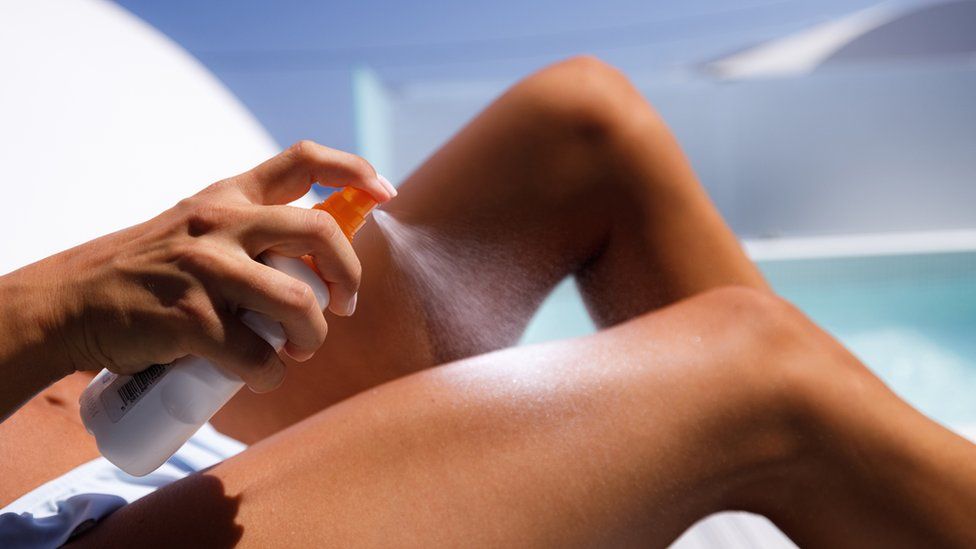ARTICLE AD BOX
 Image source, Getty Images
Image source, Getty Images
By Michelle Roberts
Digital health editor
Value added tax - better known as VAT - should be scrapped on sunscreen to make it more affordable, say several UK cancer charities.
Sunscreen is classified as a "cosmetic" product and carries a 20% tax, adding around £1.50 to the cost of a bottle.
Charities want high-factor protective creams to be VAT exempt, citing the cost-of-living crisis which has seen many struggling to buy essential items.
Most skin cancers are caused by sun damage.
There are several types of skin cancer, and melanoma is the most dangerous, as well as the most common type among young people in the UK - with cases on the rise.
If untreated, the cancer can spread to other areas of the body.
Sunbeds also increase the risk of skin cancer, with some delivering greater doses of UV rays than the midday tropical sun.
"Few realise that getting painful sunburn just once every two years can triple your risk of skin cancer," said Dr Louise Soanes, Chief Nurse, Teenage Cancer Trust.
"Preventing skin cancer by using an effective sun cream is essential - and sun cream shouldn't be a luxury that only some can afford."
Image source, Kass Barker
Cruise ship dancer Kass Barker, who says she used to be "really into sunbathing", was diagnosed with melanoma in October 2020, at the age of 22.
She had gone for a check-up of a mole on her wrist that had been worrying her.
"I just had a gut-feeling something was wrong," says Kass.
Kass wants to warn others about how serious melanoma can be.
"If there was a cream that people said could prevent breast cancer, then everyone would be buying it - but for some reason people do not see skin cancer as such a threat.
"I'm a dancer and I love being tanned, but is it worth your life? I see people on social media joking about getting sunburnt, but it's no joke. Melanoma can kill."
Image source, Kass Barker
Image caption,Kass wants people to be aware that changes to a mole - as seen on hers - can be a sign of melanoma
Possible signs of skin cancer
A mole that has changed shape, or colour, or looks and feels unusual.
- has a sore or lesion that does not heal within four weeks
- looks unusual - such as visible lumps or patches
- hurts, itches, bleeds, crusts or scabs
See a doctor if you are concerned.
Scottish National Party MP Amy Callaghan is running a campaign and petition urging government to act. She was diagnosed with melanoma at 19.
"More people wearing sunscreen means fewer people getting melanoma," said Ms Callaghan.
"But when 52% of people in my constituency can't afford to turn on the heating, it's unlikely they'll take on extra expenses like sunscreen.
"That's why we must make sunscreen more affordable, by removing VAT."
The charity Melanoma Focus surveyed 2,000 people in the UK aged 16 and over. Around half of them thought sunscreen was too expensive.
One in 10 said they didn't use it at all because of the cost.
Other reasons given for not using it included a desire to tan, a belief their skin won't burn, or a feeling that sunscreen is too messy - and unpleasant to apply or wear.
Tanning itself is actually a sign of skin damage; people don't have to burn to be at a higher risk of skin cancer.
Claire Knight, from Cancer Research UK, said: "While price may be a barrier for some, it's worth remembering that you don't need to spend a lot on a sunscreen to get good protection - what matters is an SPF of at least 15, and a star rating of 4 or 5.
"There may be other reasons people don't use sunscreen - for example, not realising that you can burn on a cloudy day, or mistakenly thinking make-up with SPF in is sufficient.
"But when it comes to sun safety, sunscreen is only part of it. Spending time in the shade and covering up with clothing are the best and cheapest ways to protect yourself against damage from too much of the sun's UV rays."
The 20% standard VAT rate applies to most goods and services, including sunscreen products purchased over the counter at pharmacies.
The exemption the campaigners are requesting would be for proven sun protection, but not foundation or other make-up containing SPF.
Are you applying sun cream properly?
Staying safe in the sun
- Wear protective clothing
- Use SPF 30+ sunscreen with at least four-star UVA protection
- Wear a wide-brimmed hat
- Wear quality sunglasses
- Seek shade from the sun whenever possible
Related Internet Links
The BBC is not responsible for the content of external sites.

 2 years ago
41
2 years ago
41








 English (US) ·
English (US) ·